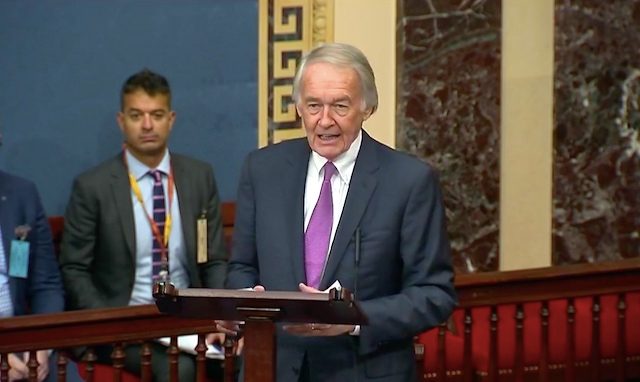SUMMARY
This is AI generated summarization, which may have errors. For context, always refer to the full article.

MANILA, Philippines – Following the United States Senate’s adoption of a resolution seeking sanctions against Philippine officials, American lawmakers called on the Duterte administration to end human rights abuses seen under its landmark anti-illegal drug campaign.
US Senators Edward Markey (Massachusetts), Marco Rubio (Florida), Dick Durbin (Illinois), Marsha Blackburn (Tennessee), and Chris Coons (Delaware) in a joint statement on Friday morning, January 10, expressed concern over eroding democratic freedoms in the Philippines and applauded the passage of their bipartisan resolution that sought accountability for human rights violations in the country.
Markey, who authored the resolution, said the US Senate’s passage of Senate Resolution 142 made it clear that the “Duterte government must end its human rights abuses.”
“While we remain a steadfast ally of the Philippines, we also remain resolute in defending human rights and the rule of law,” Markey said.
“Preventing senators and Americans from setting foot in the Philippines will not help the Duterte government brush under the rug state-sanctioned extrajudicial killings. No arbitrary detention or illegitimate charge can obscure the fact that Senator [Leila] De Lima, Maria Ressa, and all those who speak truth to power exemplify the highest democratic ideals,” he added.
What resolution? Senate Resolution 142, which was “agreed” to or adopted by a unanimous vote in the US Senate on Thursday, January 9, invokes the Global Magnitsky Act – a law that gives the US executive branch the power to impose visa and travel restrictions, as well as financial sanctions, on human rights violators anywhere in the world.
In the case of the Philippines, sanctions were invoked against government officials and security forces responsible for extrajudicial killings, and government officials responsible for De Lima’s arrest and prolonged detention. (READ: Why the Global Magnitsky Act matters to the Philippines)
The same resolution also denounced the “harassment, arrest, and unjustified judicial proceedings” against media, particularly Rappler and its CEO Maria Ressa. It called on the Philippine government to “guarantee the right to the freedom of the press” and to drop all charges against Rappler and Ressa. (LIST: Cases vs Maria Resa, Rappler directors, staff since 2018)
Tit for tat: The measure did not go unnoticed by President Rodrigo Duterte. Irked by what he saw as an intrusion on Philippine affairs, Duterte decided to bar Markey from entering the Philippines.
Duterte also banned Durbin and US Senator Patrick Leahy, who pushed for an entry ban against Philippine officials involved in the detention of De Lima. The ban was included in the US State Department’s 2020 budget.
For Durbin, the Duterte government’s actions only showed its continued disrespect for “fundamental freedoms and human rights.” (READ: U.S. Senator Durbin: De Lima case ‘important test’ for PH democracy)
“Passage of this bipartisan resolution shows that the U.S. Senate stands united in our condemnation of his government’s troubling behavior and democratic backsliding. We also continue our call for the need to release Senator Leila de Lima and for the Duterte government to end the harassment of journalists,” he said.
Today, the Senate passed a bipartisan resolution condemning the ongoing human rights abuses in the Philippines. Passage of this resolution shows that the U.S. Senate stands united in our condemnation of the Duterte government’s ongoing troubling behavior & democratic backsliding. pic.twitter.com/fke53GhxWy
— Senator Dick Durbin (@SenatorDurbin) January 9, 2020
Blackburn emphasized the need for the Philippines to respect human rights, saying extrajudicial killings as well as the harassment of De Lima and Ressa were “unconscionable.”
“We value our relationship with the Philippines. But the US Congress expects to see real change to the current practices of the Duterte government,” she said.
Coons, meanwhile, said the US Senate’s passage of the resolution displayed US commitment to promote “human rights and accountability in all parts of the world.”
“We have the responsibility to call out the grave human rights violations committed by President Duterte’s government, including against prominent political leaders, human rights activists, and members of the press,” he said. – Rappler.com
Add a comment
How does this make you feel?
There are no comments yet. Add your comment to start the conversation.